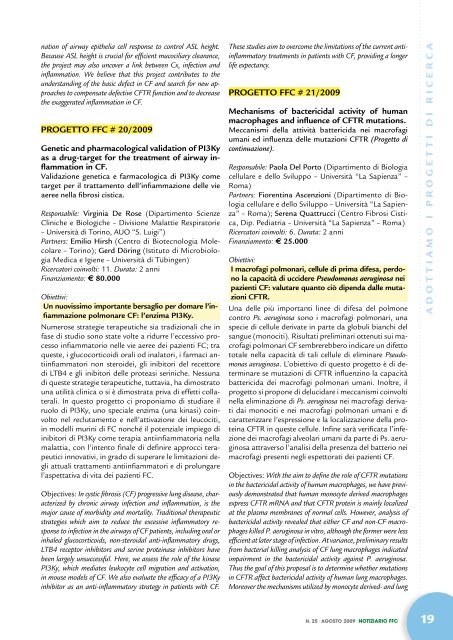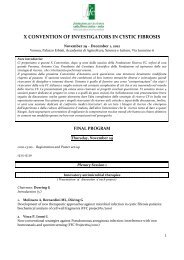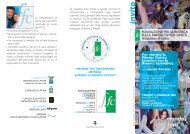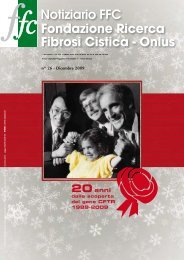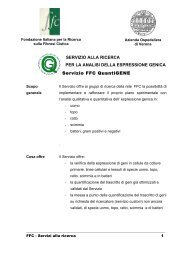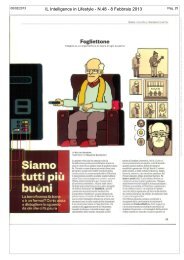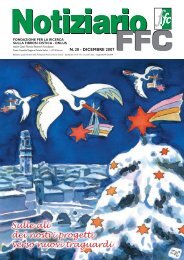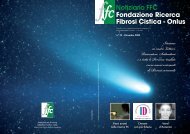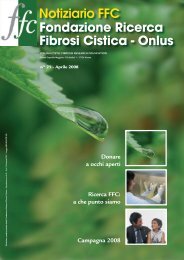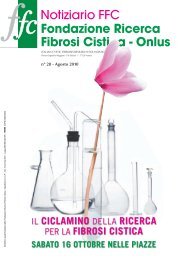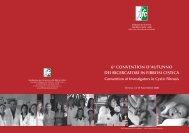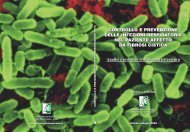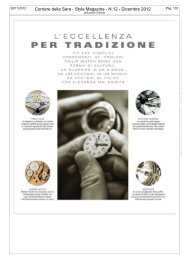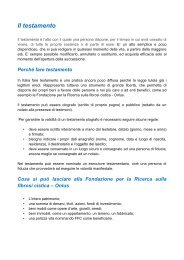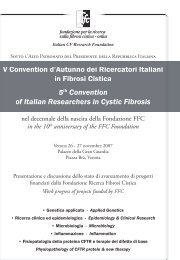Notiziario n. 25 - Fondazione Ricerca Fibrosi Cistica
Notiziario n. 25 - Fondazione Ricerca Fibrosi Cistica
Notiziario n. 25 - Fondazione Ricerca Fibrosi Cistica
Create successful ePaper yourself
Turn your PDF publications into a flip-book with our unique Google optimized e-Paper software.
nation of airway epithelia cell response to control ASL height.<br />
Because ASL height is crucial for efficient mucociliary clearance,<br />
the project may also uncover a link between Cx, infection and<br />
inflammation. We believe that this project contributes to the<br />
understanding of the basic defect in CF and search for new approaches<br />
to compensate defective CFTR function and to decrease<br />
the exaggerated inflammation in CF.<br />
Progetto FFC # 20/2009<br />
Genetic and pharmacological validation of PI3Ky<br />
as a drug-target for the treatment of airway inflammation<br />
in CF.<br />
Validazione genetica e farmacologica di PI3Ky come<br />
target per il trattamento dell’infiammazione delle vie<br />
aeree nella fibrosi cistica.<br />
Responsabile: Virginia De Rose (Dipartimento Scienze<br />
Cliniche e Biologiche – Divisione Malattie Respiratorie<br />
– Università di Torino, AUO “S. Luigi”)<br />
Partners: Emilio Hirsh (Centro di Biotecnologia Molecolare<br />
– Torino); Gerd Döring (Istituto di Microbiologia<br />
Medica e Igiene – Università di Tübingen)<br />
<strong>Ricerca</strong>tori coinvolti: 11. Durata: 2 anni<br />
Finanziamento: € 80.000<br />
Obiettivi:<br />
Un nuovissimo importante bersaglio per domare l’infiammazione<br />
polmonare CF: l’enzima PI3Ky.<br />
Numerose strategie terapeutiche sia tradizionali che in<br />
fase di studio sono state volte a ridurre l’eccessivo processo<br />
infiammatorio nelle vie aeree dei pazienti FC; tra<br />
queste, i glucocorticoidi orali od inalatori, i farmaci antiinfiammatori<br />
non steroidei, gli inibitori del recettore<br />
di LTB4 e gli inibitori delle proteasi seriniche. Nessuna<br />
di queste strategie terapeutiche, tuttavia, ha dimostrato<br />
una utilità clinica o si è dimostrata priva di effetti collaterali.<br />
In questo progetto ci proponiamo di studiare il<br />
ruolo di PI3Ky, uno speciale enzima (una kinasi) coinvolto<br />
nel reclutamento e nell’attivazione dei leucociti,<br />
in modelli murini di FC nonché il potenziale impiego di<br />
inibitori di PI3Ky come terapia antiinfiammatoria nella<br />
malattia, con l’intento finale di definire approcci terapeutici<br />
innovativi, in grado di superare le limitazioni degli<br />
attuali trattamenti antiinfiammatori e di prolungare<br />
l’aspettativa di vita dei pazienti FC.<br />
Objectives: In cystic fibrosis (CF) progressive lung disease, characterized<br />
by chronic airway infection and inflammation, is the<br />
major cause of morbidity and mortality. Traditional therapeutic<br />
strategies which aim to reduce the excessive inflammatory response<br />
to infection in the airways of CF patients, including oral or<br />
inhaled glucocorticoids, non-steroidal anti-inflammatory drugs,<br />
LTB4 receptor inhibitors and serine proteinase inhibitors have<br />
been largely unsuccessful. Here, we assess the role of the kinase<br />
PI3Ky, which mediates leukocyte cell migration and activation,<br />
in mouse models of CF. We also evaluate the efficacy of a PI3Ky<br />
inhibitor as an anti-inflammatory strategy in patients with CF.<br />
These studies aim to overcome the limitations of the current antiinflammatory<br />
treatments in patients with CF, providing a longer<br />
life expectancy.<br />
Progetto FFC # 21/2009<br />
Mechanisms of bactericidal activity of human<br />
macrophages and influence of CFTR mutations.<br />
Meccanismi della attività battericida nei macrofagi<br />
umani ed influenza delle mutazioni CFTR (Progetto di<br />
continuazione).<br />
Responsabile: Paola Del Porto (Dipartimento di Biologia<br />
cellulare e dello Sviluppo – Università “La Sapienza” –<br />
Roma)<br />
Partners: Fiorentina Ascenzioni (Dipartimento di Biologia<br />
cellulare e dello Sviluppo – Università “La Sapienza”<br />
– Roma); Serena Quattrucci (Centro <strong>Fibrosi</strong> <strong>Cistica</strong>,<br />
Dip. Pediatria – Università “La Sapienza” – Roma)<br />
<strong>Ricerca</strong>tori coinvolti: 6. Durata: 2 anni<br />
Finanziamento: € <strong>25</strong>.000<br />
Obiettivi:<br />
I macrofagi polmonari, cellule di prima difesa, perdono<br />
la capacità di uccidere Pseudomonas aeruginosa nei<br />
pazienti CF: valutare quanto ciò dipenda dalle mutazioni<br />
CFTR.<br />
Una delle più importanti linee di difesa del polmone<br />
contro Ps. aeruginosa sono i macrofagi polmonari, una<br />
specie di cellule derivate in parte da globuli bianchi del<br />
sangue (monociti). Risultati preliminari ottenuti sui macrofagi<br />
polmonari CF sembrerebbero indicare un difetto<br />
totale nella capacità di tali cellule di eliminare Pseudomonas<br />
aeruginosa. L’obiettivo di questo progetto è di determinare<br />
se mutazioni di CFTR influenzino la capacità<br />
battericida dei macrofagi polmonari umani. Inoltre, il<br />
progetto si propone di delucidare i meccanismi coinvolti<br />
nella eliminazione di Ps. aeruginosa nei macrofagi derivati<br />
dai monociti e nei macrofagi polmonari umani e di<br />
caratterizzare l’espressione e la localizzazione della proteina<br />
CFTR in queste cellule. Infine sarà verificata l’infezione<br />
dei macrofagi alveolari umani da parte di Ps. aeruginosa<br />
attraverso l’analisi della presenza del batterio nei<br />
macrofagi presenti negli espettorati dei pazienti CF.<br />
Objectives: With the aim to define the role of CFTR mutations<br />
in the bactericidal activity of human macrophages, we have previously<br />
demonstrated that human monocyte derived macrophages<br />
express CFTR mRNA and that CFTR protein is mainly localized<br />
at the plasma membranes of normal cells. However, analysis of<br />
bactericidal activity revealed that either CF and non-CF macrophages<br />
killed P. aeruginosa in vitro, although the former were less<br />
efficient at later stage of infection. At variance, preliminary results<br />
from bacterial killing analysis of CF lung macrophages indicated<br />
impairment in the bactericidal activity against P. aeruginosa.<br />
Thus the goal of this proposal is to determine whether mutations<br />
in CFTR affect bactericidal activity of human lung macrophages.<br />
Moreover the mechanisms utilized by monocyte derived- and lung<br />
ADOTTIAMO I PROGETTI DI RICERCA<br />
N. <strong>25</strong> • AGOSTO 2009 • NOTIZIARIO FFC<br />
19


